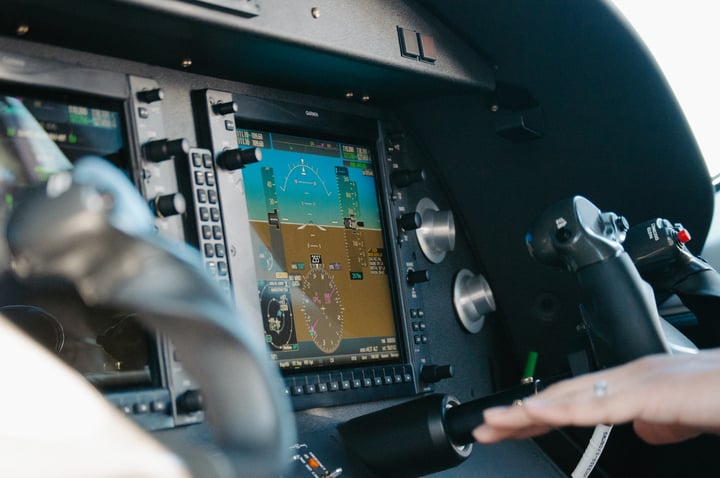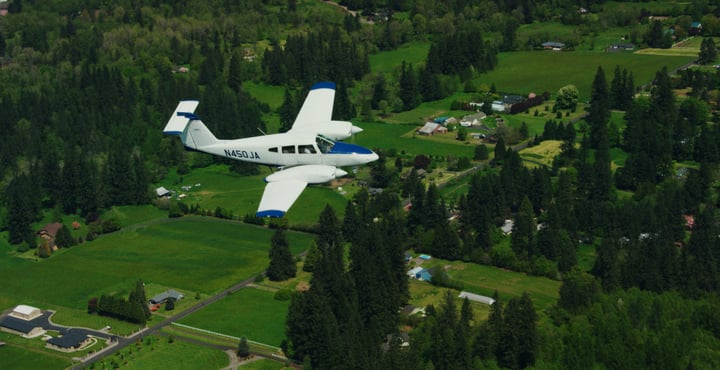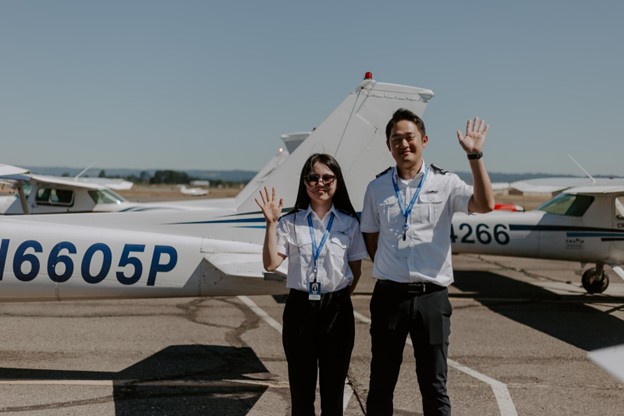Deciding on a career path can often leave you feeling stuck at a crossroads. On one hand, you want a job that pays well and offers stability, but you also want a fulfilling and exciting career.
If you are someone who has always been fascinated with flying and dreams of becoming a pilot, then we say YES to pursuing your dreams in aviation. Here are 12 reasons why:

12 Reasons to Become a Pilot
Becoming a pilot offers a variety of career options, freeing you from the confines of a cubicle-bound job. You'll enjoy travel opportunities, lucrative pay, and flight benefits while working with dynamic colleagues and experiencing a varied schedule.
1-Variety of Career Options
Choosing to pursue a pilot career opens the door to a wide array of opportunities beyond just flying commercial airlines. Many pilots start their journey with flight training only to discover the vast possibilities in aviation.
There are countless opportunities in the skies, whether it's teaching aspiring pilots, flying corporate jets for large corporations, or piloting chartered flights for luxurious travel.
Each direction shapes your skill set and enriches your professional life with unique experiences.
Diversification within the aviation sector allows pilots to tailor their careers according to personal interests and lifestyle preferences. You might find yourself flying humanitarian aid missions one day and exploring remote corners of the world as a bush pilot the next.
This variety ensures that being a pilot is more than just a job; it's a highly rewarding career that keeps evolving as you gain experience and explore new avenues within the vast skies of opportunity.
2-Unique Work Environment
Pilots can experience the most exceptional office views as dynamic horizons and expansive skies constantly surround them. Unlike traditional occupations that are limited to a confined workspace, a pilot's environment extends across continents and oceans.
This dynamic environment brings unparalleled freedom and excitement to every workday. It's not just about escaping the office; it's about embracing a workspace as vast as the sky.
You'll navigate through different time zones, weather patterns, and landscapes, making your life professionally and personally rewarding. This diversity keeps your job interesting and engaging, far removed from the monotony of typical desk jobs.
Flight training prepares you for this extraordinary career where each day offers new challenges and experiences. Working as a commercial pilot means no two days are alike.
3-Travel Opportunities
Travel opportunities abound for those working for most commercial operators. You can explore new destinations, experience different cultures, and enjoy sights many only dream of seeing.
This aspect of being a pilot goes beyond traditional job benefits; it offers a chance to truly broaden one's horizons.
Flying as a professional pilot means you often have access to travel discounts, making personal trips more affordable. Your schedule might vary, but this flexibility allows you to take advantage of visiting places across the globe during your downtime.
Flying becomes not just your job but also a gateway to adventure and discovery around the world.
4-Lucrative Pay
Pilots enjoy lucrative pay, with the potential for significant earnings as they gain experience and seniority. According to the Bureau of Labor Statistics, the average annual salary for airline pilots, copilots, and flight engineers is around $211,790, offering substantial financial rewards.
Additionally, pilots often receive attractive benefits such as healthcare coverage and retirement plans, adding further value to their compensation packages.
With dedication and commitment, you can progress in your career to attain competitive salaries within the aviation industry. The earning potential, coupled with the intrinsic rewards of piloting, makes it an appealing career choice for those seeking both financial stability and professional fulfillment.
5-Flight Benefits
Pilots enjoy numerous flight benefits, including discounted or free travel for themselves and sometimes their families. This perk allows pilots to explore new destinations and create unforgettable memories at a fraction of the cost.
Flexible working hours also enable them to take advantage of these travel opportunities without compromising their commitments. The perks of flying make being a pilot not only a job but also a way of life brimming with excitement and discovery.
Furthermore, seniority perks in many airlines grant pilots greater control over their schedules, allowing them to prioritize personal pursuits while still pursuing their aviation careers.

6-Flexible Schedule
Pilots enjoy a varied schedule, often including overnight layovers and multiple days off between flights. This flexibility provides opportunities for rest, leisure, and the chance to explore new destinations during downtime.
The flexible schedule also promotes a better harmony between work and personal life, enabling individuals to handle personal obligations while pursuing a career in aviation efficiently.
7-Benefits and Initiatives
The aviation industry offers seniority perks that greatly impact a pilot's career progression. As a pilot's seniority increases, they gain more autonomy over their schedule and a wider selection of routes to choose from.
Advancing in seniority also brings advantages such as better pay rates, priority for preferred vacation days, and shift schedules that promote a better work-life balance.
Building and maintaining positive relationships with colleagues is crucial for climbing the seniority ladder. By accumulating flight hours, pilots can steadily rise through the ranks within an airline and enjoy the benefits that come with higher seniority.
8-Dynamic Colleagues
Piloting is a profession where you'll be surrounded by dynamic colleagues who share your passion for flying.
Working alongside dedicated aviation professionals can provide mentorship opportunities and foster a supportive environment as you navigate the intricacies of the skies. Collaborating with experienced pilots allows you to learn from their expertise, gaining valuable insights into the industry.
Additionally, interacting with diverse individuals, including flight attendants, ground crew, and air traffic controllers, helps you create a network of like-minded peers committed to ensuring safe and efficient flights.
9-Work-Life Balance
Achieving a work-life balance as a pilot is feasible due to the flexible schedule and extended time off between flights. Pilots often enjoy several consecutive days off, providing ample time for personal pursuits and relaxation.
Additionally, the option to bid for specific schedules contributes to better control over work hours.
Furthermore, industry guidelines limit the number of flight hours pilots can undertake within a specific timeframe. This ensures that pilots have enough downtime to rest and recharge before their next assignment, promoting a healthier work-life balance overall.
10-International Opportunities
Piloting offers exciting international opportunities. With global demand for pilots rising, you can explore diverse cultures and destinations while advancing your career.
As aviation regulations continue to evolve worldwide, gaining experience in different regions will set you apart as a versatile and adaptable professional. Working internationally provides the chance to build relationships with colleagues and passengers from around the world, broadening your perspective both personally and professionally.
Moreover, international opportunities in the aviation industry offer exposure to various aircraft types and operational procedures present in different countries. This exposure increases your marketability as a pilot within the industry when pursuing future job prospects or career advancements.
11-Mental Stimulation
Mental stimulation is a key part of becoming a pilot. Constantly assessing weather conditions, managing complex flight plans, and operating advanced aircraft systems provide ongoing mental challenges.
Pilots must use critical thinking skills to make split-second decisions during flights and confidently navigate diverse scenarios. Modern aircraft technology constantly evolves, so pilots are required to stay updated on the latest advancements in aviation. This ensures a mentally stimulating career that fosters continuous learning and growth.
The aviation industry's ever-changing nature keeps pilots engaged and motivated. From mastering new routes to adapting to different flying conditions, every flight presents unique mental challenges and opportunities for skill development.
12- Doing Something You Love
Choosing a career that aligns with your passions and interests is essential for long-term satisfaction and fulfillment. Becoming a pilot allows you to turn your love for aviation into a rewarding profession, offering the opportunity to take flight through the skies and experience the thrill of flying daily.
The sense of accomplishment derived from mastering complex aircraft controls and navigating through various weather conditions can be immensely gratifying. This makes each day in the cockpit an adventure fueled by your passion for flying.
Furthermore, pursuing a career as a pilot allows you to blend work with pleasure; you get paid to do what you genuinely love. Aspire to join a passionate group of professionals who share your admiration for aviation while enjoying all the perks associated with piloting, such as traveling to new destinations, witnessing breathtaking aerial views, and continuously honing your skills in an environment that perfectly complements your passion.
Getting Started
The journey to a pilot career requires a rigorous path but ultimately paves the way for a career filled with adventure and professional growth. To become a professional pilot, you'll need to pursue a journey that includes finding a reputable flight school to initiate your training, undergoing rigorous flight training through a comprehensive program, and actively building an aviation network.
Consider Flight Schools
Pursuing a career as a pilot involves obtaining the necessary training and licenses. Enrolling in flight school is the first step towards achieving this goal. It provides structured instruction, hands-on experience in aircraft operation, and a comprehensive knowledge of aviation regulations.
With more than four decades of experience training professional pilots, Hillsboro Aero Academy stands out in this industry. Our school has a strong reputation and is among the few flight schools in the US with such extensive experience. This allows us to provide valuable guidance to individuals seeking to obtain their pilot ratings and certificates and pursue careers in the aviation field.
Training through a flight school, aspiring pilots are equipped with the skills needed to handle various flying conditions and emergencies, fostering confidence and competence in the cockpit. Flight training typically consists of ground and flight training, focusing on safety, navigation, and aircraft systems. Students must pass written and practical exams to earn pilot licenses. In addition to the technical aspects of flying, flight school also emphasizes the importance of decision-making, communication, and teamwork, as pilots must be.
Find a Comprehensive Training Program
Becoming a commercial pilot requires obtaining specific licenses such as a private pilot certificate, instrument rating, commercial pilot license, multi-engine rating, if applicable, and airline transport pilot (ATP) certificate eventually. Enrolling in a comprehensive training course, such as our Airplane Professional Pilot Program here at Hillsboro Aero Academy, gives you the tools to successfully begin your career, including supportive instructors, real-world flight environments, Federal Aviation Administration (FAA)-approved pilot classes, and more.
A comprehensive pilot training course is essential for aspiring aviators, covering theoretical knowledge, practical flight skills, and safety procedures. Topics range from aerodynamics to navigation and regulations, with hands-on training under experienced instructors. Simulated flight exercises prepare students for various conditions and emergencies, fostering decision-making skills and confidence. Emphasis on professionalism, situational awareness, and effective communication equips pilots for success in aviation. Such a course provides the knowledge, skills, and mindset necessary for safe and confident navigation of the skies, supporting the journey to becoming a professional pilot.
Begin Building a Pilot Network
To further your piloting career networking plays a crucial role in your professional career as it enables student pilots to connect with industry experts, cultivate relationships, and acquire invaluable insights and guidance. By engaging with experienced pilots, aviation professionals, and peers throughout flight training, student pilots can broaden their expertise and prospects, unlocking new pathways for their professional journey.
This networking aspect serves as a vital resource for aspiring pilots aiming to optimize their learning experiences, enhance their competencies, and position themselves strategically for future accomplishments within the aviation sector.
Ready For The First Step?
The decision to pursue a career as a pilot offers a multitude of compelling reasons, from having a variety of career options to choosing a career that aligns with something you love on a daily. Whether driven by a passion for aviation, a desire for adventure, or the appeal of a dynamic career, aspiring pilots have much to gain. As you begin on this exhilarating journey, we encourage you to take the first step and reach out to our admissions team to explore the next steps and discuss the diverse array of career path options awaiting them in the world of aviation. You can reach out to our team at info@flyhaa.com or call 503.726.3000 to schedule a meeting and tour our campuses.
Your dream of taking to the skies awaits—we're here when you're ready to join a community with a shared passion for flight!
FAQs
1. What makes being a pilot a rewarding career?
Becoming a pilot offers you a chance to experience one of the most uniquely fulfilling careers out there. As an airline or commercial pilot, you get to explore new horizons, literally and figuratively, every day. This career provides financial stability and gives you thrilling experiences, making it a hugely rewarding career.
2. Is becoming an airline or commercial pilot for everyone?
Pursuing an airline or commercial pilot career requires dedication and hard work, but the payoff is incredibly worthwhile for those passionate about flying. If you love traveling, embracing challenges, and seeking adventures that are out of the ordinary, then this path could be perfect for you.
3. How do most pilots describe their job?
Most pilots often describe their job as exhilarating and never dull. Many commercial pilots cherish the opportunity to see the world from thousands of feet in the air and take pride in safely transporting passengers to their destinations across continents.
4. Will choosing to become a pilot offer long-term benefits?
Yes! Choosing to become a pilot sets you on a course for personal growth and professional development beyond your imagination. A commercial airline pilot can receive a competitive salary and benefits like travel perks not just for themselves but often for their families too – painting it as more than just another job but a lifestyle choice that keeps giving back.


